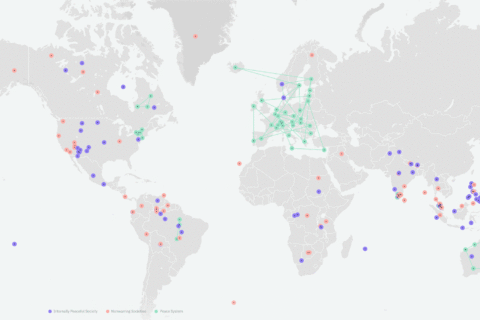Jinwoo Jung, Hyuk Joon Kwon, Hojin Lee, Tae Yoon Lim, and Matt Mackenzie‘s capstone project, entitled “The Power of Peace Speech,” addressed challenges at the intersection of data science and social science that illustrate the complex, multifaceted, and ambitious nature of the work that SPP undertakes.
SPP is a multidisciplinary, multimethod initiative that leverages data science, complexity science, and anthropology to develop new ways to understand and promote sustainably “peaceful” societies. The initiative is led by Peter T. Coleman, a professor of psychology and education, director of the Morton Deutsch International Center for Cooperation and Conflict Resolution at Teachers College, executive director of the Advanced Consortium for Cooperation, Conflict, and Complexity at The Earth Institute, and a leading expert in constructive conflict resolution.
At its core, SPP attempts to investigate, quantify, and map an ambiguous state—that of “sustained peace.” “Much of intellectual history has focused on understanding the opposite—states of conflict—in order to develop better approaches to prevention,” Dr. Coleman explains. “The Sustaining Peace Project flips the framework, examining the characteristics and qualities of societies that have successfully sustained peace within and between themselves in order to better understand what we want to promote.”
Through “The Power of Peace Speech” project, the students aimed to explore, identify, and potentially quantify a possible relationship between specific terms in online news media and conditions on the ground. This involved a number of complex data engineering, data analysis, pre-processing, hypothesis testing, and modeling tasks, most notably categorizing societies by state (“peaceful,” “neutral,” “conflicting”), and developing lexicons of terms that would be prevalent in these societies.
